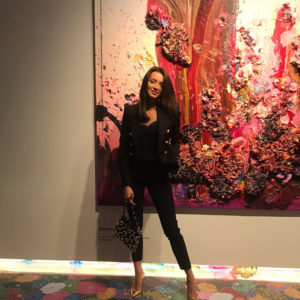Navigating Entrepreneurship During the Pandemic

A student view on entrepreneurship during the pandemic. MA Entrepreneurship student, Stephanie Beard, shares 5 take-aways from the “Fashioning Change” conference that addressed the fashion industry’s adaptations to the Coronavirus crisis.
Most people will tell you to enrol in a Masters’ Program if you’re looking to make a career change. And, for most of the MA students at Condé Nast College, this was the motivation for enrolling. Now, with the pandemic at hand and the consequential downturn of the economy, our foresight into the job market has been blurred. In order to address this shift, our academic advisors implemented a two-day course into the curriculum, called “Fashioning Change”, exploring what comes next in a post COVID-19 industry.
Humanity & Adaptability
High up on the list of changes during COVID-19 is how media coverage has changed over the past two months. This has shed light on humanity, as efforts are directed to riding this wave alongside media consumers and connecting with them in meaningful ways. Adaptability has also become key in the current climate with an emphasis on how professionals have had to get creative and rethink how they do their jobs – even if their profession doesn’t normally call for creativity in the obvious ways that we often think of it in. This approach to creativity, as a strategy for responding to change is familiar to the Condé Nast College MA Entrepreneurship students, who have incorporated the practice while building their business plans over the last term.

An MA Entrepreneurship Student’s 5 Key Take-Aways from Fashioning Change
Stephanie Beard, who is currently studying MA Entrepreneurship: Fashion & Creative Industries shares her tips for entrepreneurs in fashion during coronavirus that have emerged from attending the “Fashioning Change” event, and how she will implement what she has learned into her own business model.
After graduating from the London College Of Fashion, Stephanie Beard gained work experience in the fashion industry and the corporate sector as a PA , which meant extensive worldwide travel. During this period of time, she came up with the concept of a womenswear brand, which led her to enroll in the MA Entrepreneurship program at Condé Nast College in London.
As part of the course, Masters students were asked to virtually attend the ‘Fashioning Change’ conference, which has left Stephanie with a positive and constructive outlook on how to navigate through this challenging period. She’s a strong believer that creativity can thrive in limitation and sees this period of slowing down as an opportunity to unpack ideas – rendering this time to think more valuable for emerging entrepreneurs than first thought… Here are her key take-aways from “Fashioning Change”:
1. The Power of NOW
This time should be utilised as much as possible to your advantage. Never before are people absorbing content online as much as they are now and this is an ideal opportunity to tap into the benefits of people slowing down and consuming more visual content. This is a unique opportunity to gain feedback, to test and to learn and to build a loyal and engaging customer following to put you in a stronger position post-crisis.
2. Adapt and Innovate
This situation has particularly highlighted that it is imperative that entrepreneurs be agile and resilient. When navigating a new business through this time adapting to the shift in consumer behaviour and the economic situation means innovation will be necessary. This could be in the form of pivoting your strategy to a more digital mindset or innovating an entirely new purpose-driven business model that is more meaningful and valuable to the consumer.
3. Become customer-centric obsessed
If it wasn’t important enough before, knowing and understanding your customer is now essential. This challenging period has made consumers more conscious with what they are buying into and tapping into consumers’ needs over their wants online and also offline post pandemic will champion. Riding this wave with them and showing how their new needs are understood and met will strengthen the brand/consumer relationship resulting in building and maintaining brand loyalty and trust throughout. “If you’re not creating with them, you can’t create for them” Alex Rückheim, Sense Worldwide.
4. Radical Transparency
As society now enters a period of increased awareness on how our actions and behaviours affect ourselves, others and our environment, consumers are seeking honesty and transparency. This means sustainability will remain at the forefront and issues such as overproduction will have to be addressed. Brands will now have to navigate and revise global supply chain relationships and there will be an opportunity for a strong reevaluation of domestic or more local production and manufacturing where consumers are assured sustainable practice is implemented.
5. Go Digital but remain experiential
Undoubtedly fashion brands now need to strengthen their digital strategies and communication as the world view has now moved online and is set to remain post-pandemic. Despite this, engaging with your customer online still needs to involve the essence of the ‘In Real Life’ experience as much as possible. This will maintain the same shift towards immersive experiences that customers were increasingly desiring previously. Creative and dynamic social media activities that involve strong engagement and strengthen a brand’s community will prevail.
Although the virus has inarguably affected the fashion industry indefinitely, there seems now, more than ever, the chance to re-start and to reset. There are always opportunities in times of change and in spotting them and using them to her advantage Stephanie, like many others, aims to creatively think her way through this unprecedented time and achieve a stronger business model and fashion future for her brand as we move into the ‘New Normal’.
By MA Entrepreneurship program student, Stephanie Beard and MA Fashion Media Practice student, Megan McClelland
Fashioning Change: The Changing Landscape of the Fashion & Media Industries
